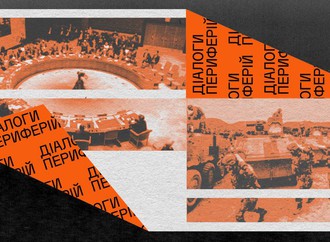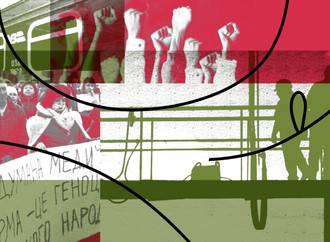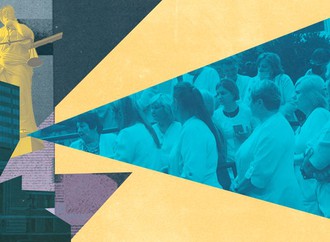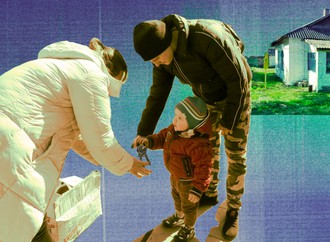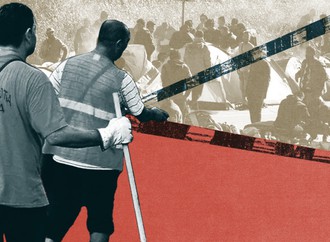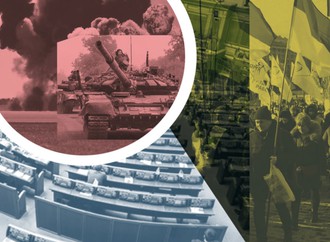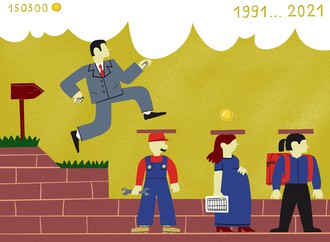In wartime, the fight for labour rights is becoming extremely significant as military actions put more risks on employees at the workplace while economic loss often forces the government to decrease the protection of labour rights. Thus, the war has justified neoliberal privatisation policy and cutbacks of the social sector for many governments. At the same time, civil society and trade unions have fewer opportunities to influence this process. The most mobile social groups, especially youth, are often forced to leave their countries for safety and better prospects. These processes can be seen in four countries that have gone or are still going through neoliberal crises while in the situation of ongoing or frozen conflicts — Ukraine, Armenia, Georgia, and Moldova.
Within the conference “Dialogues of the Peripheries”, the activists from these countries discussed how to continue the struggle in the conditions of war, forced displacement and mass migration. Trade union activist Artem Tidva moderated the discussion; Raisa Liparteliani from the Georgian Trade Union Confederation (GTUC), Anait Asatryan from the Armenian Trade Union of Civil Servants, Vasyl Andreyev from the Federation of Trade Unions of Ukraine and Construction Workers’ Union of Ukraine and also representative of the Clean Clothes Campaign and PLATFORMA in Moldova Lilia Nenesku told about the situation in their countries.
Eurointegration and outcomes of neoliberal reforms in Georgia
The reforms in Georgia in 2005-2006 cancelled numerous mechanisms that protected employees. The politicians justified these measures by corruption in public institutions, support of business and attraction of investors. They hoped it would have a positive effect on the economy and decrease the unemployment level.
“After the official statistics data were announced, we revealed very soon that our neoliberal government failed to reach the planned goal. The only reality of that time in Georgia — was a systematic violation of main labour rights and trade union rights; the number of occupational accidents, including lethal ones, increased dramatically”, said Raisa Liparteliani, representative of the Georgian Trade Union Confederation (GTUC).
Then, the Georgian Trade Union Confederation (GTUC) found it difficult to fight against neoliberal government reforms, because the latter had a good international image due to democratic reforms, including the anti-corruption one. Therefore, as Liparteliani stresses, they needed time to persuade international partners that Georgian employees were indeed suffering from the neoliberal programme.

A public meeting in the centre of Tbilisi in support of EU integration. Photo: newsgeorgia.ge
The Georgian Trade Union Confederation (GTUC) — already a member of the International Labour Organization (ILO) — started actively using mechanisms available in the ILO to prove the numerous cases of violations of trade union rights in the country.
“After we used all national measures of legal protection, initiatives for change, legislation, courts procedures and all the mechanisms available on a national level, we started introducing international mechanisms actively”, adds the activist.
Analysing those events, Liparteliani stresses that it was important to use the ILO's mechanisms and those available in the European Union. Though Georgia didn’t sign the Association Agreement, the country was in the EU integration process. The Generalised Scheme of Preferences, General GSP+, already obliged Georgia to maintain the main labour standards of the ILO.
In 2007-2009, due to international support and coverage of the violation of labour rights in Georgia, several international organisations protecting social and labour rights sent their critical recommendations to the Georgian government. They emphasised that the government cannot continue EU integration if social protection and labour conditions do not comply with international standards.
In 2013 the Confederation reached certain amendments in legislation which contributed to signing the Association Agreement with the EU. The action plan for further years was immediately taken to continue the successful integration; among others it included the renewal of the Labour Inspectorate. In 2020, the Confederation reached improved labour standards and the introduction of a full labour inspectorate.
“I cannot say the outcomes of neoliberal policy remained in the past. Certainly, Georgia has made progress in labour legislation and law enforcement, yet we still suffer from outcomes of neoliberal policies in the country”, states the union member.
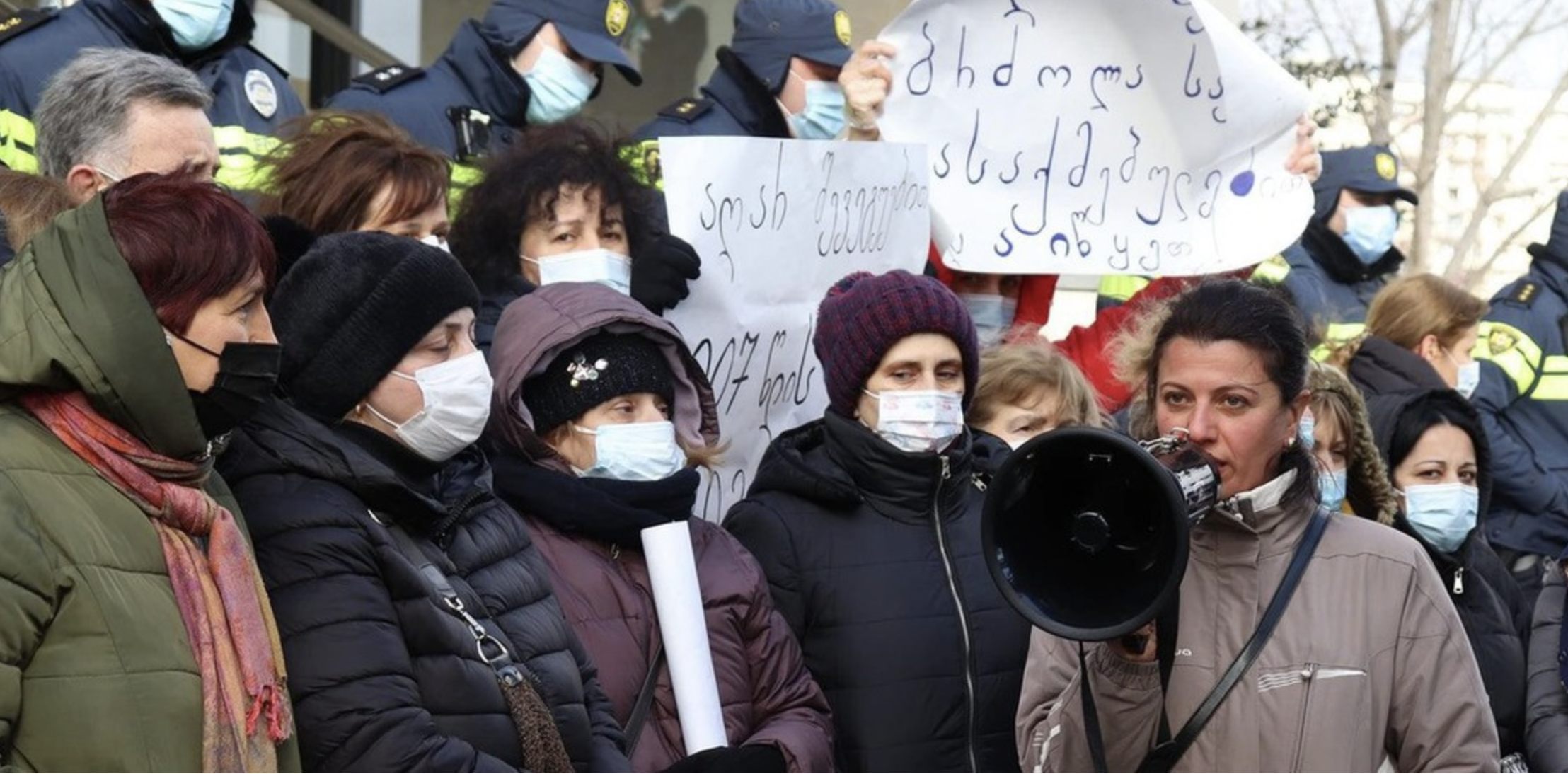
Social workers’ public meeting for salary rise in Georgia. Photo: Georgian association of social workers (GASW)
It is necessary to raise benefits and social payments in Georgia today, particularly unemployment benefits, while unemployment is high in the country. One can also see an increase in the share of informal employment while the country’s minimum wage — only 7 euros per month — is the lowest among European countries.
“We are doing our best to improve some standards for employees, but almost 40% of them cannot use main labour rights as they work informally”, explains Raisa Liparteliani.
Besides, the country has high rates of gender inequality in the labour market and an annually increasing level of emigration. Liparteliani is confident that the only way to increase the standards and improve Georgian employees’ lives is to speed up the EU integration process:
“As the Georgian Trade Union Confederation, we actively support the general process of Georgia’s EU integration, which lasts for over 30 years. The main argument is the defence of human rights, including labour rights; we realise it’s the only way to improve the current standards and solve problems on a national level”.
The process of liberalisation amid the 30-year Karabakh conflict
In 1921, by the decision of Joseph Stalin, two Armenian regions, Nakhchivan and Nagorno-Karabakh, were transferred to Azerbaijan. Due to Azerbaijani politics, Armenians were forced to leave Nakhchivan, but they stayed in Nagorno-Karabakh. In the late 1980s, Karabakh attempted to join Armenia. In 1988, war broke out that has been fading or erupting with a new wave — today, the conflict has lasted for 32 years.
Amid that, the liberalisation process in Armenia, as Anait Asatryan from the Armenian Trade Union of Civil Servants regards, started even before the collapse of the Soviet Union — when the cooperatives spread.
“After the Soviet Union collapsed, many enterprises were privatised. People lost their jobs, and the economic connections with Soviet states faded. The government didn’t control labour relations. And now people who used to work in cooperatives cannot get their pensions: the state doesn’t count the work experience for the years they worked there”, emphasises the labour union activist.
In the 2000s it was believed in Armenia that market relations could regulate all the processes in the economy. So as late as 2005, the government adopted a new labour code — which though was far from ideal by limiting the right to strike — followed the labour unions' proposals.
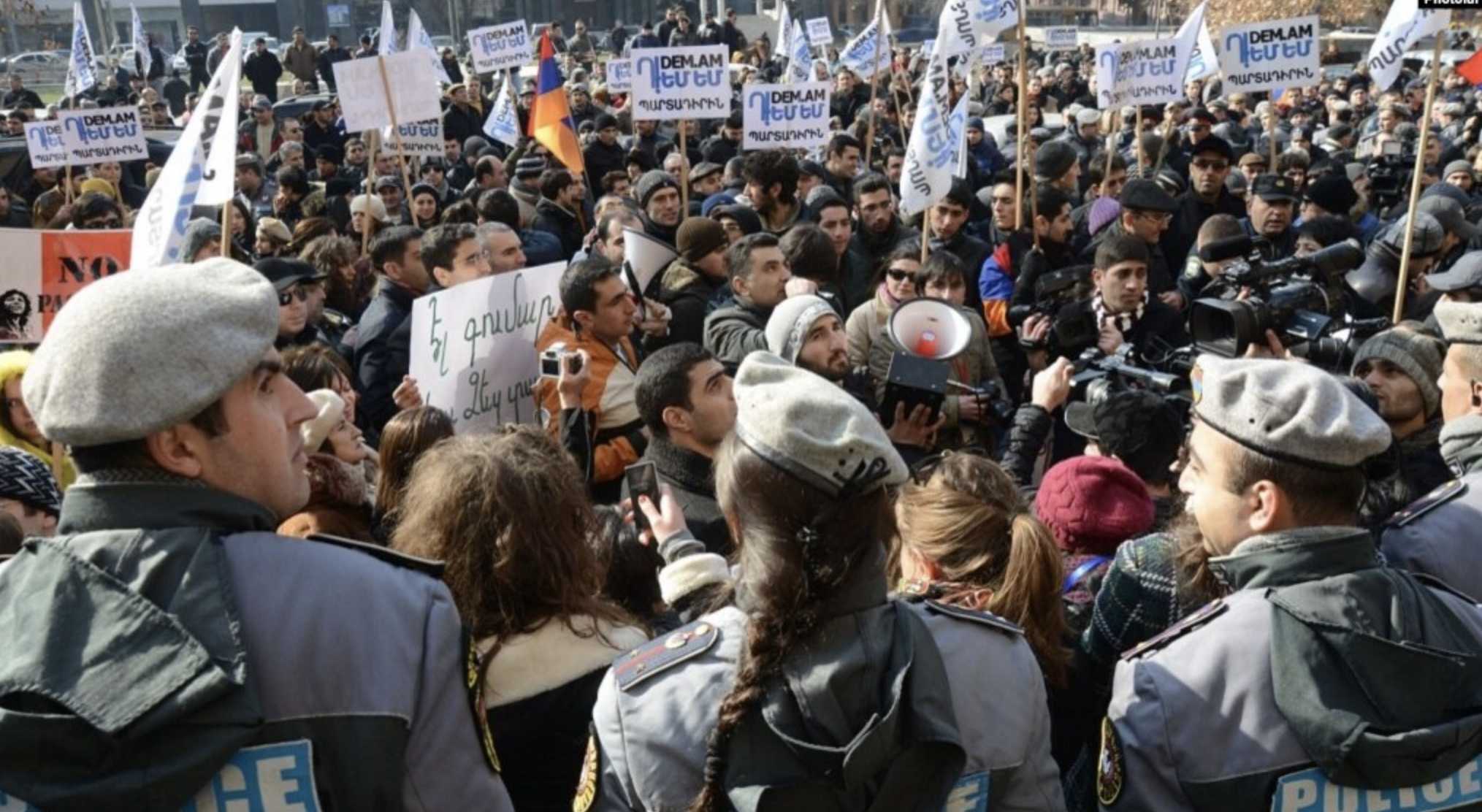
A demonstration against pension reform in Yerevan, February 6, 2014. Armenia. Photo: Phtolur
Yet, since 2011, there have been similar processes in Armenia to the ones in neighbouring Georgia. The power of regulatory bodies like the Labour Inspectorate was gradually reduced and fully cancelled in 2013. The social security system was also affected: the pension fund was liquidated, and social security deductions and income tax were merged. It was explained that all these measures were taken to fight corruption and promote business development.
After another escalation of the Karabakh conflict in 2016, Armenia’s government paid attention to the low level of army supply, so they adopted a law which made all employees pay about 2 euros to the Insurance Fund yearly. After a 40-day escalation in 2020, it turned out that the Fund was short of money, so the government decided to increase the charges. The Armenian Trade Union of Civil Servants opposed this decision.
“We believed that the state was obligated to provide insurance for the military personnel; still, even the Confederation of Trade Unions did not support us in fright of being conceived as a traitor. Hence, after the war escalated, the workers were bound to pay another levy”, explained Anait Astryan.
After the revolution in 2018, when mass protests prevented Serzh Sargsyan from usurping power, it seemed there was progress in the relations between the government and labour unions, says the activist. She was offered to nominate as a candidate from the ruling party in the Yerevan mayoral elections. Also the voices of labour unions were partially heard in the process of changing the legislation.
“We participated in discussing amendments to the Labour Code and evaluated the proposed amendments. We couldn’t reach significant changes, but some amendments were considered.”

Protests against Serzh Sargsyan being appointed a prime minister of Armenia. Yerevan, 19 April, 2018. Photo: Reuters
Currently, the Labour Code has amendments to 122 articles. It entered into force in August, but, as the labour union representative says, there are many issues to promote. In the context of the latest escalation in Karabakh that caused 100,000 Armenians to lose their jobs and flee from the region, Anait Asatryan states that the safety problem has a tremendous impact on the pace of decision-making in Armenia.
The recovery of Ukraine — is not only about walls but also about labour markets
Since February 2022, Ukraine has undergone numerous changes and faced problems that other countries in our region have struggled to solve for decades, considers Vasyl Andreyev from the Construction Workers’ Union of Ukraine.
At the beginning of the Russian full-scale invasion of Ukraine, there were discussions to introduce martial law, forced labour and the necessity of an increase in working hours to 60 or 80 hours a week. But the changes in the economy showed there were more people available than work.
Yet the regressive moves in protecting employees came shortly afterwards: in March of 2022 the Verkhovna Rada passed a law regulating labour relations during a military situation. The innovation was adopted in favour of employers — the restriction of the right to conclude collective bargaining agreements indicates it. The changes seriously affected labour unions and labour collectives.
“The amendments in the legislation were sporadic, and in May, the law was revised again. The employers were using it retroactively. The range of innovations indicated that the government tried to reduce their expenses and increase business efficiency when employees evacuated abroad or couldn’t work due to constant shellings”, told Andreyev.
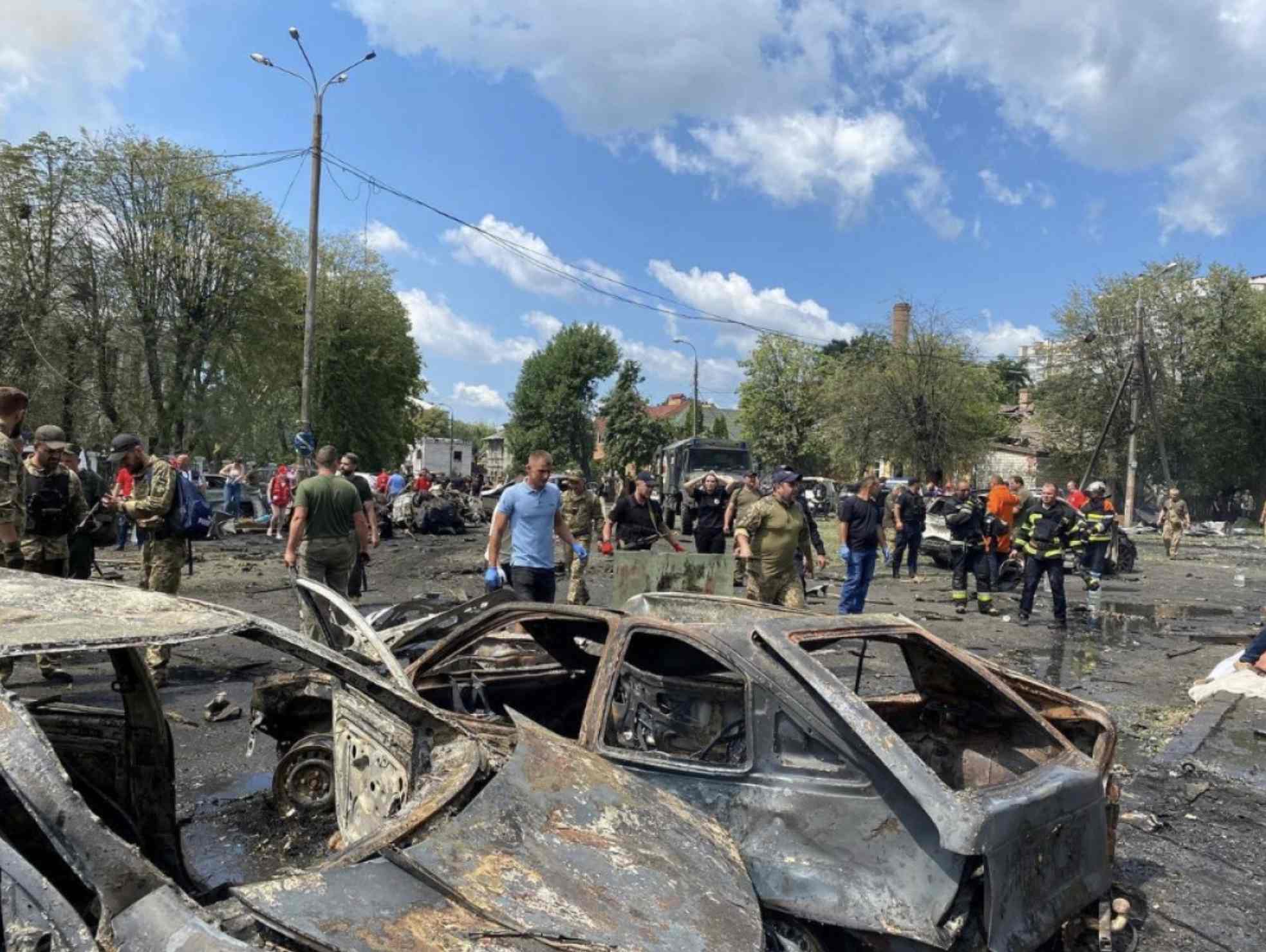 Eliminating the consequences of missile attacks in Vinnytsia, 15 July, 2022. Photo: State Emergency Service of Ukraine
Eliminating the consequences of missile attacks in Vinnytsia, 15 July, 2022. Photo: State Emergency Service of Ukraine
Later, the second phase of reform began, during which questions of amendments in the Labour code arose. Although the draft law that cancelled the labour unions’ right to approve their employees’ dismissal from work was rejected, eventually, the law was adopted with terrible outcomes for employees. The major regress concerned protecting the human rights of those working in small and medium-sized enterprises of up to 200 people.
“Fortunately, the law remained “dead”. At least, according to our statistics, none of the employers we know didn’t use the new opportunity to cancel all labour rights for employees in companies with an amount less than 200 people”, emphasises the union activist.
In late 2022 Social Insurance Fund merged with the Pension Fund, and thus it was basically abolished. At the same time, problems in the Pension Fund are increasing: the official number of employed people is decreasing, the number of pensioners is increasing, and many people are leaving abroad.
The reaction of unions to this dramatic pressure on regulations and labour protection varied from the depressive closing down of activities to self-organisation. Some labour unions united with lawyers, turned to courts and inspections, pressed employers who didn’t fulfil their duties, and delayed salaries for months.
“The government set new terms to appeal unpaid salaries and unlawful dismissal after the person got fired…It’s important to remember there’s a time limit between 1 and 3 months to receive a writ of execution either to pay a salary or to return to the workplace and receive compensation for forced absence”, explains Andreyev.
Grassroots self-organisation of employees is an important counterforce to the attack on labour rights. According to the union activist, such self-organisation is palpable first and foremost in the wage sector. Andreyev emphasises that employees unite and explain to each other the importance of upholding agreements about minimum fare at regional labour markets.
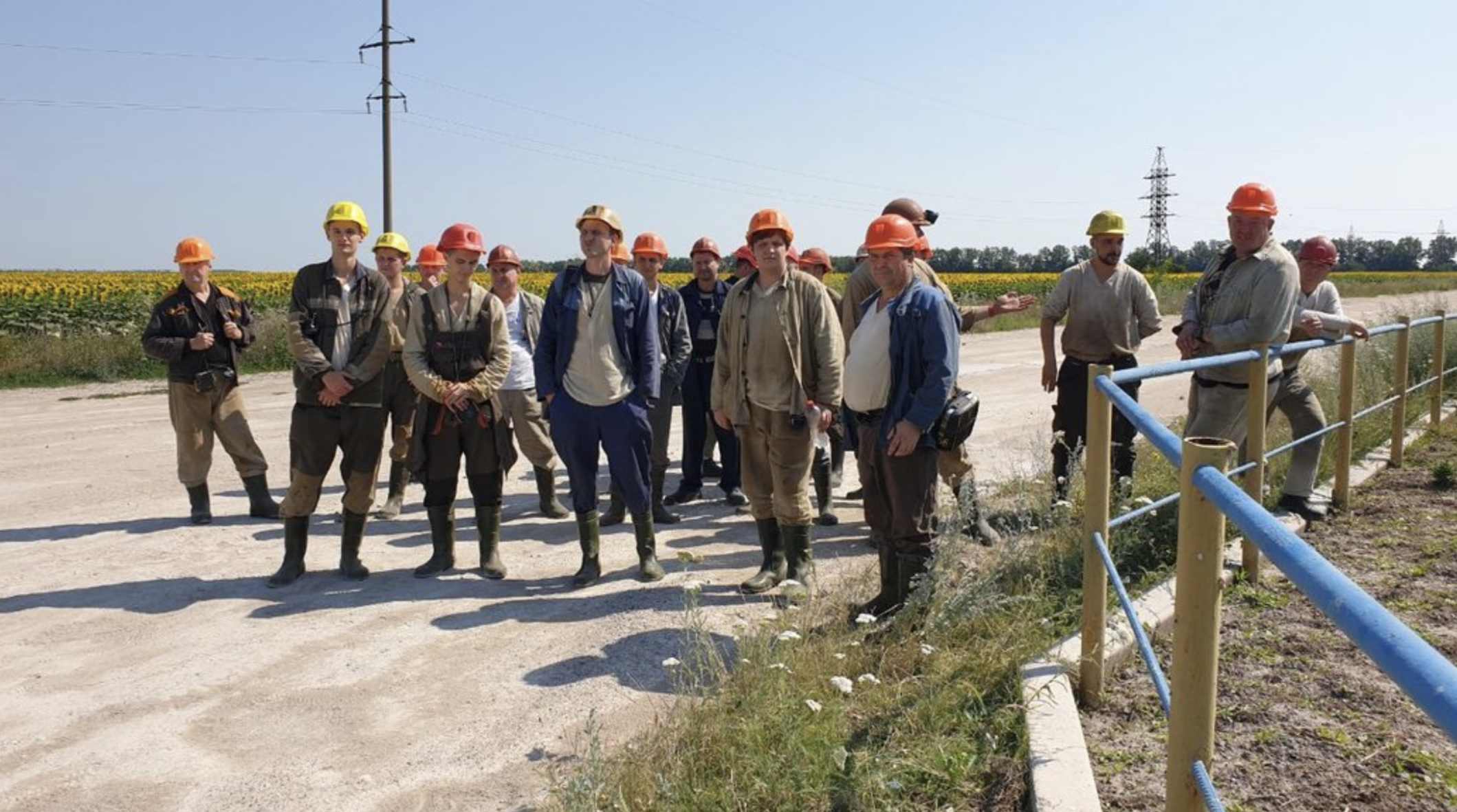
Miners of Novokostiantynisvks mine “Schid HZK” protest against non-payment of wages, July 2023, Kirovohrad region. Photo: Suspilne Kropyvnytskyi
Even in difficult conditions of war conflict, there are some positive changes, particularly in the construction sector, which is extremely important both during the war and with the prospect of reconstruction. Such progress is possible due to unions’ ability to take advantage of societal and economic changes to promote labour rights.
“Tens of thousands of our colleagues lost their jobs, left abroad or were conscripted into the military, yet the number for defence orders is increasing, and the number of qualified workers keeps decreasing. We try to involve and maintain a workforce in big enterprises within collective and other agreements. A lack of workforce can sometimes lead to a salary rise by 30-40 %, and sometimes twice as much compared to 2021”.
A trade union leader finds it important to explain to international donors that the renovation project — is not only about walls and water supply but also about labour markets during and after the reconstruction.
“We hope that self-organisation and elucidation of labour rights and innovations to employees could help to return to pre-war regulation of labour relations and protection of employees rights”, summarises Andreyev.
Neoliberal symptoms in the economy of Moldova
Work flexibilization, the spread of atypical employment and an increase in informality and instability — all these tendencies are available in Moldova and other Eastern European countries. Labour poverty is regarded as a separate problem by a Clean Clothes Campaign and PLATFORMA representative, Lilia Nenesku. It happens when people have a few jobs but don’t have enough money to cover their basic living expenses.
According to the country's government, low wages are an advantage for foreign investments in Moldova. In 2022, 65% of employees received a salary below average. In 2018, a minimum salary comprised only 18% of the living wage, but only 11% of people still receive a below-average salary. Meanwhile, very few workers get united into trade unions.
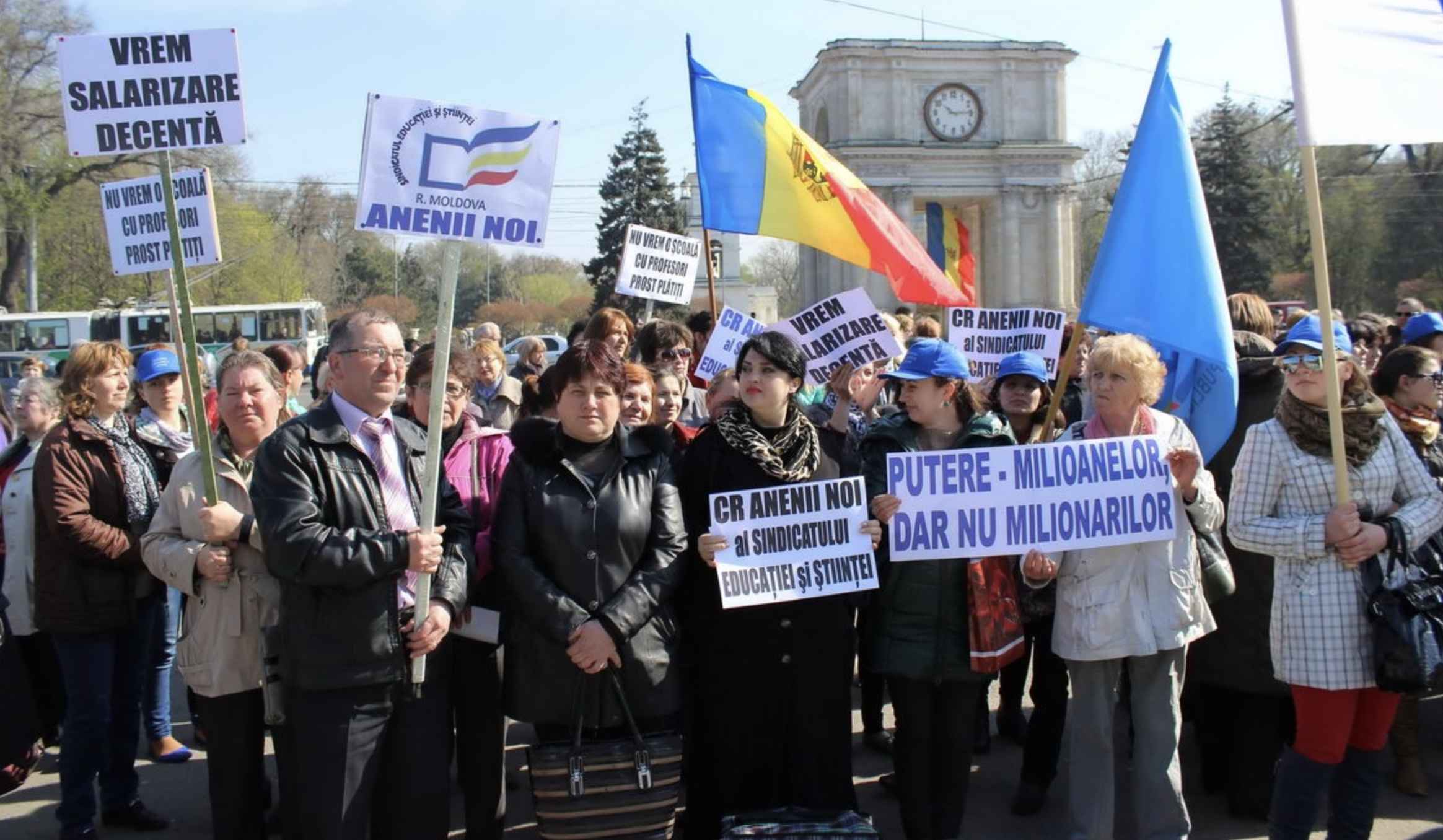
Teachers in Chisinau demand a raise in salaries, April 2017. Moldova. Photo: pon.org.ua
Apart from that, there are constant changes to the labour code and legislation (the most recent were adopted in 2022), which leads to the weakening of employees’ rights.
“They increased overtime hours, claiming them as a benefit for employees as they could legally get paid for overtime. Yet the number of allowed overtime hours was increased twice”, underlines the researcher, stating that now employers are legally entitled to exploit employees.
Nanesku adds that it’s not mandatory now for a labour union to vote on the decisions related to staff dismissal, and the probation period was also increased. It means that employees have no rights while they’re on probation. Or their rights are minimal.
In these conditions, only very few people attempt to fight while the others look for another job or migrate.
“Almost a third of the population, which is almost a million people, went to work abroad. In the last three years, there was one of the biggest migration waves — almost 100,000 people migrated from Moldova”, says Nenesku.
Research by the ILOin 2017 states that around a quarter of labour migrants from Moldova have a work permit in a country of residence. About 50% had a certain temporary permit, which didn’t legalise their employment. At the same time, 12% of labour migrants haven’t had any legal status at all.
Though Moldova is a country of emigration, about 1 million refugees from Ukraine crossed its border in February 2022, and 110,000 people have resided there now.
In March 2022, an emergency commission made an exclusion and allowed refugees from Ukraine to work in Moldova without receiving a residence permit for work. Yet such a move was limited within a state of emergency, which was prolonged every two months.
“It meant that the legal status of refugees was uncertain and unpredictable — varying from the residence permit to the right to health services, education and work. It significantly affected how refugees from Ukraine could plan their lives and integrate into society as they could be legally employed only by short-term contracts for up to 2 months. It leads to refugees being hired illegally without rights protection and with a high risk of exploitation”, explains Nenesku.
On March 1, 2023, Moldova adopted a temporary protection mechanism and abolished all the rights previously granted by an emergency commission that tried to encourage refugees from Ukraine to ask for temporary protection.
“According to official data, around 1200 refugees from Ukraine, which comprises about 1% of the general amount of refugees present now in Moldova, are employed”, states the activist.
But we should consider the context of the data. Until now, over half of refugees living in Moldova don’t have legal status, over half of all refugees are children, about 80% — are women, and most of them are mothers looking after children. This number doesn’t include people working from a distance and keeping their workplace in Ukraine, working online for other companies, or doing illegal, for example, seasonal agricultural work.
“The law about temporary shelter has just been adopted. The government decided nothing could prevent refugees from working now. The biggest problem and priority at all the forums and meetings is encouraging refugees to work”, emphasises Nenesku.
The researcher regards it as a symptom of a neoliberal society focused on work where each worker is equally valuable to their productivity, and their rights, social security, and protection are determined by their professional competence.
Also, the legal status of Ukrainian refugees determined access to other services and rights. For example, a strategy is being developed to consolidate the reception centres for asylum seekers in Moldova — ten centres have to close by December 2023, and another eight are being revised. Thus the government wants to reduce financial expenses on refugees and encourage them to get employed.
“Only those who meet the vulnerability criteria can stay; the others will have to move. In transition, people who move out can use the subsidy to rent accommodation for six months, only in case they’re legally employed”, tells Nenesku.
The conditions for refugees in Moldova can be truly difficult, considering constant violations of labour rights. People are vulnerable as they don’t know the country’s legislation, language and system to protect their rights.
“At PLATFORMA we developed a programme to help refugees find decent jobs in Moldova and get legal advice on labour rights protection. We’ve been working on it purposefully for the last year and a half”, summarises the researcher.
***
In conditions of military aggression and fighting, labour rights become vulnerable to economic shocks and attacks of neoliberal governments. As a result, employees face low wages, weak protection of labour rights and absence of proper working conditions. In search of safety and a decent life, fleeing from violation of labour rights and exploitation, part of them become refugees and migrants. The activity of labour unions in Armenia, Georgia, Moldova and Ukraine proves that active participation and self-organisation of employees have a high chance to influence the working conditions and legislation even in difficult challenges in crisis or war. Exchange of experience of labour union fighting can help analyse disastrous outcomes of neoliberal policies and create alternative strategies of influence on antisocial government policies.



